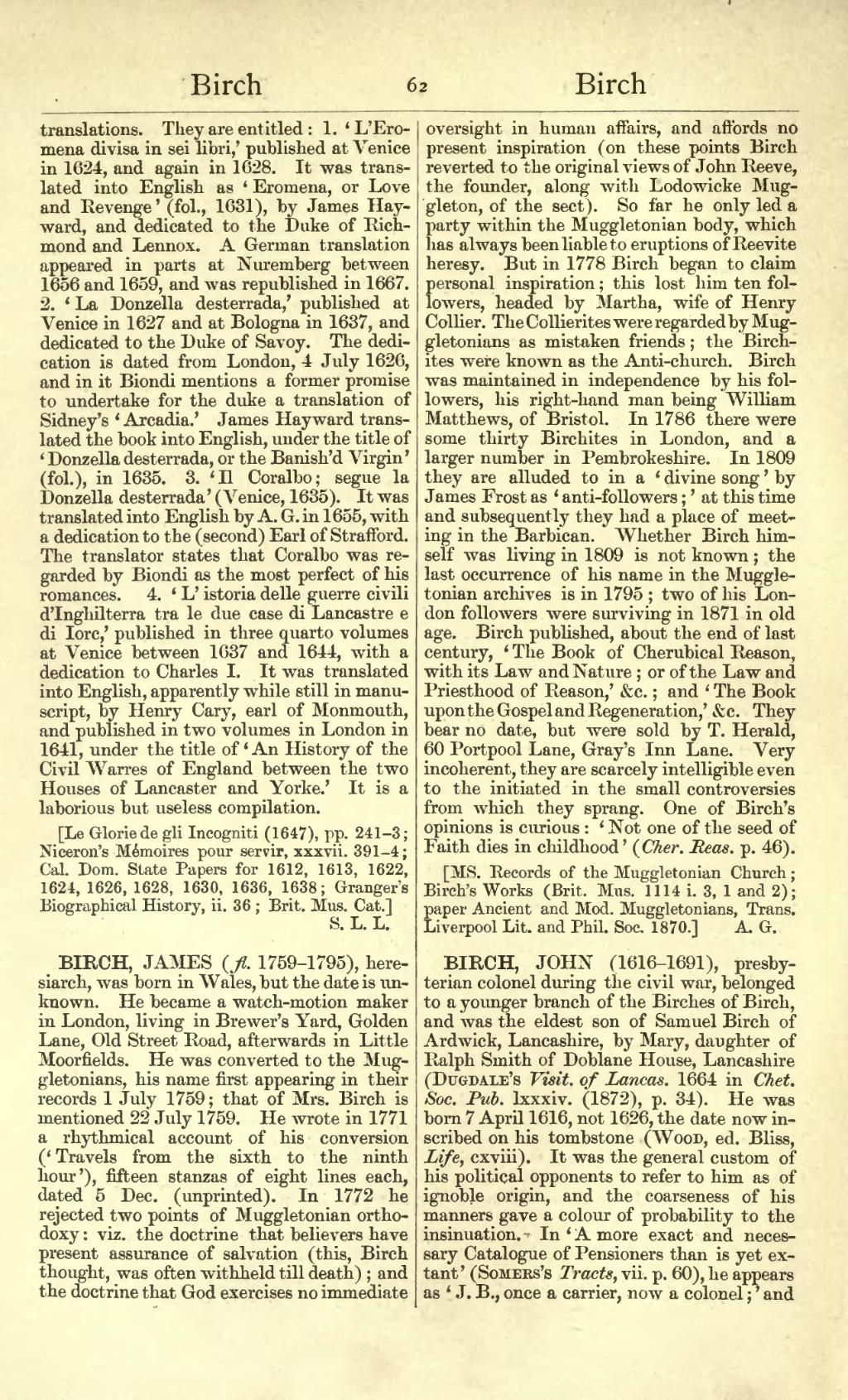translations. They are entitled: 1. 'L'Eromena divisa in sei libri,' published at Venice in 1624, and again in 1628. It was translated into English as 'Eromena, or Love and Revenge' (fol., 1631), by James Hayward, and dedicated to the Duke of Richmond and Lennox. A German translation appeared in parts at Nuremberg between 1656 and 1659, and was republished in 1667. 2, 'La Donzella desterrada,' published at Venice in 1627 and at Bologna in 1637, and dedicated to the Duke of Savoy. The dedication is dated from London, 4 July 1626, and in it Biondi mentions a former promise to undertake for the duke a translation of Sidney's 'Arcadia.' James Hayward translated the book into English, under the title of 'Donzella desterrada, or the Banish'd Virgin' (fol.), in 1635. 3. 'Il Coralbo; segue la Donzella desterrada' (Venice, 1635). It was translated into English by A. G. in 1655, with a dedication to the (second) Earl of Strafford. The translator states that Coralbo was regarded by Biondi as the most perfect of his romances. 4. 'L'istoria delle guerre civili d'Inghilterra tra le due case di Lancastre e di Iorc,' published in three quarto volumes at Venice between 1637 and 1644, with a dedication to Charles I. It was translated into English, apparently while still in manuscript, by Henry Cary, earl of Monmouth, and published in two volumes in London in 1641, under the title of 'An History of the Civil Warres of England between the two Houses of Lancaster and Yorke.' It is a laborious but useless compilation.
[Le Glorie de gli Incogniti (1647), pp. 241-3; Niceron's Mémoires pour servir, xxxvii. 391-4; Cal. Dom. State Papers for 1612, 1613, 1622, 1624, 1626, 1628, 1630, 1636, 1638; Granger's Biographical History, ii. 36; Brit. Mus. Cat.]
BIRCH, JAMES (fl. 1759–1795), heresiarch, was born in Wales, but the date is unknown. He became a watch-motion maker in London, living in Brewer's Yard, Golden Lane, Old Street Road, afterwards in Little Moorfields. He was converted to the Muggletonians, his name first appearing in their records 1 July 1759; that of Mrs. Birch is mentioned 22 July 1759. He wrote in 1771 a rhythmical account of his conversion ('Travels from the sixth to the ninth hour'), fifteen stanzas of eight lines each, dated 5 Dec. (unprinted). In 1772 he rejected two points of Muggletonian orthodoxy: viz. the doctrine that believers have present assurance of salvation (this, Birch thought, was often withheld till death); and the doctrine that God exercises no immediate oversight in human affairs, and affords no present inspiration (on these points Birch reverted to the original views of John Reeve, the founder, along with Lodowicke Muggleton, of the sect). So far he only led a party within the Muggletonian body, which has always been liable to eruptions of Reevite heresy. But in 1778 Birch began to claim personal inspiration; this lost him ten followers, headed by Martha, wife of Henry Collier. The Collierites were regarded by Muggletonians as mistaken friends; the Birchites were known as the Anti-church. Birch was maintained in independence by his followers, his right-hand man being William Matthews, of Bristol. In 1786 there were some thirty Birchites in London, and a larger number in Pembrokeshire. In 1809 they are alluded to in a 'divine song' by James Frost as 'anti-followers;' at this time and subsequently they had a place of meeting in the Barbican. Whether Birch himself was living in 1809 is not known; the last occurrence of his name in the Muggletonian archives is in 1795; two of his London followers were surviving in 1871 in old age. Birch published, about the end of last century, 'The Book of Cherubical Reason, with its Law and Nature; or of the Law and Priesthood of Reason,' &c.; and 'The Book upon the Gospel and Regeneration,' &c. They bear no date, but were sold by T. Herald, 60 Portpool Lane, Gray's Inn Lane. Very incoherent, they are scarcely intelligible even to the initiated in the small controversies from which they sprang. One of Birch's opinions is curious: 'Not one of the seed of Faith dies in childhood' (Cher. Reas. p. 46).
[MS. Records of the Muggletonian Church; Birch's Works (Brit. Mus. 1114 i. 3, 1 and 2); paper Ancient and Mod. Muggletonians, Trans. Liverpool Lit. and Phil. Soc. 1870.]
BIRCH, JOHN (1616–1691), presbyterian colonel during the civil war, belonged to a younger branch of the Birches of Birch, and was the eldest son of Samuel Birch of Ardwick, Lancashire, by Mary, daughter of Ralph Smith of Doblane House, Lancashire (Dugdale's Visit. of Lancas. 1664 in Chet. Soc. Pub. lxxxiv. (1872), p. 34). He was born 7 April 1616, not 1626, the date now inscribed on his tombstone (Wood, ed. Bliss, Life, cxviii). It was the general custom of his political opponents to refer to him as of ignoble origin, and the coarseness of his manners gave a colour of probability to the insinuation. In 'A more exact and necessary Catalogue of Pensioners than is yet extant' (Somer's Tracts, vii. p. 60), he appears as 'J.B., once a carrier, now a colonel;' and
